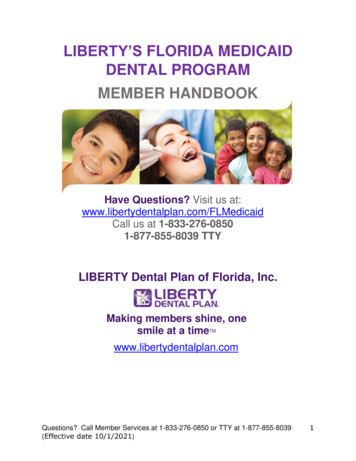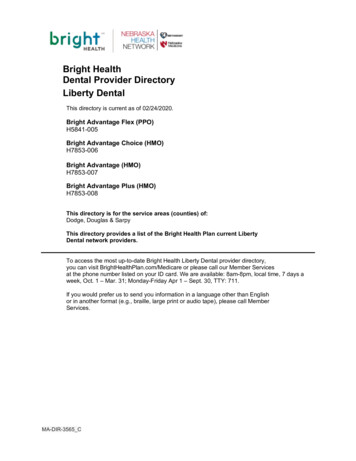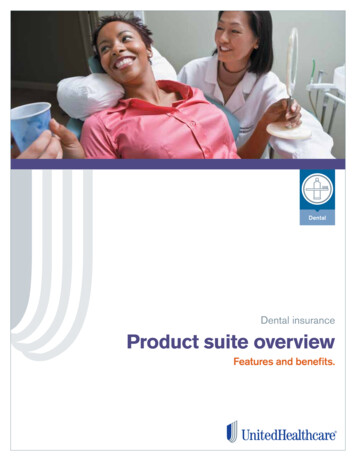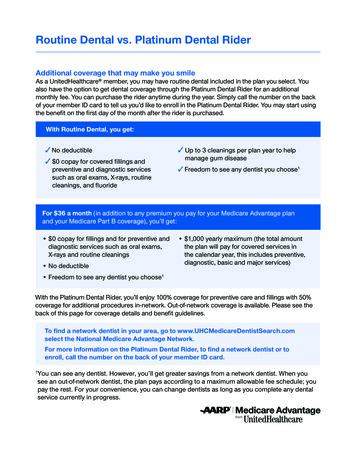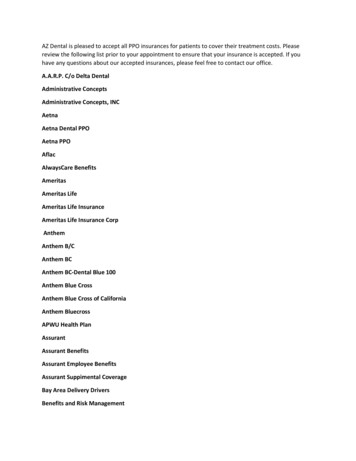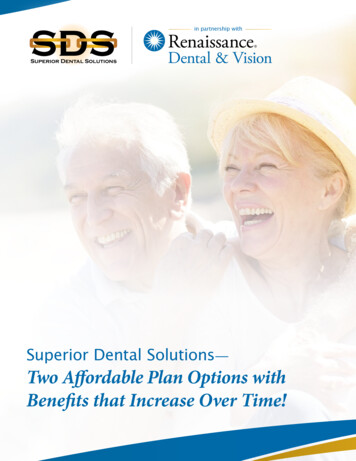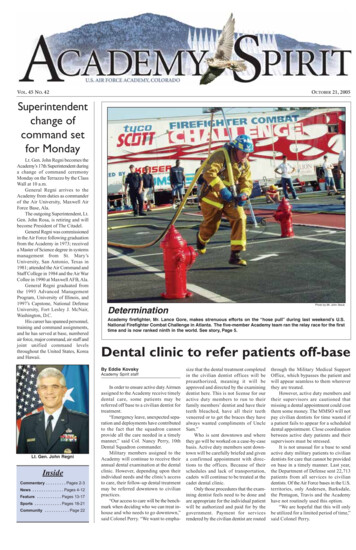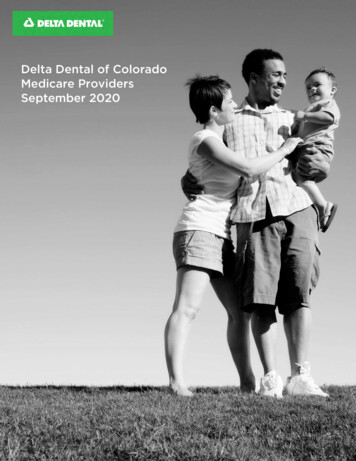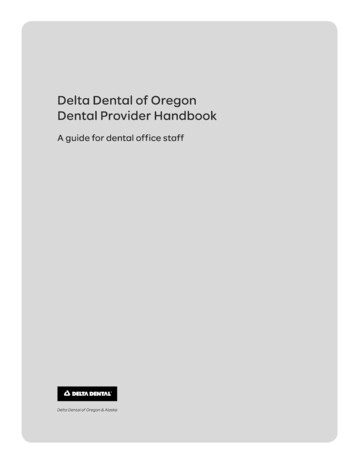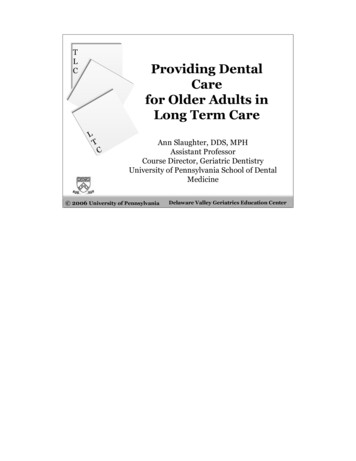
Transcription
TLCProviding DentalCarefor Older Adults inLong Term CareLTCAnn Slaughter, DDS, MPHAssistant ProfessorCourse Director, Geriatric DentistryUniversity of Pennsylvania School of DentalMedicine University of Pennsylvania 2006 University of PennsylvaniaDelaware Valley Geriatrics Education Center1
TLCLEARNING OBJECTIVESDirect Care Staff will be able to:1.LDiscuss why good dental healthpromotes overall health and qualityof life2. Describe the potential benefits toTnursing care delivery when dailydental care is maintainedC3.Discuss plaque bacteria and howprevention can protect the mouth fromdamage caused by plaque University of Pennsylvania 2006 University of PennsylvaniaDelaware Valley Geriatrics Education CenterThis presentation is designed to educate non-dental health care providers,particularly direct care staff in the provision of mouth care for older personsresiding in long-term care facilities.The module has the following learning objectives: Discuss why good dental health promotes overall health and quality of life Describe the potential benefits to nursing care delivery when daily dental care ismaintained Discuss plaque bacteria and how prevention can protect the mouth from damagecaused by plaque2
TLCLEARNING OBJECTIVESDirect Care Staff will be able to:LT4.Identify ways to control plaque in olderpersons that are functionally dependentand cognitively impaired5.Identify visible dental problems thatshould be reported to the nurse or otherhealthcare provider who might refer tothe dentistC University of Pennsylvania 2006 University of PennsylvaniaDelaware Valley Geriatrics Education CenterOther learning objectives include: Identify ways to control plaque in older persons that are functionally dependentand cognitively impaired Identify visible dental problems that should be reported to the nurse or otherhealthcare provider who might refer to the dentist3
TLCWhy is Oral HealthImportant?LDental disease is commonin the nursing home andhomebound populationTC University of Pennsylvania 2006 University of PennsylvaniaDelaware Valley Geriatrics Education Center Dental health is important because dental disease and mouth problems arecommon in the nursing home and homebound population. You have probably noticed that many of the persons you care for have problemswith their mouths.4
TLCThe mouth is a mirror ofhealth and diseaseSigns can be seen in the mouth L TC Systemic DiseaseBacterial and FungalInfectionsNutritional Deficiencies University of Pennsylvania 2006 University of PennsylvaniaDelaware Valley Geriatrics Education CenterThe mouth has been called a mirror of health and disease because there you find: signs of systemic diseases, microbial infections, and nutritional deficiencies.All can be seen in the mouth.5
TLCImportance of Dental Health toOverall Health and Well-BeingPoor dental health can makeother problems worseLTC Cardiovascular DiseaseDiabetesMalnutritionStrokePneumonia University of Pennsylvania 2006 University of PennsylvaniaDelaware Valley Geriatrics Education Center Oral health and general health should not be thought of as being separate. Cardiovascular disease, diabetes, malnutrition, stroke and pneumonia arecommon conditions in many of the patients you care for. Poor oral health can makethese medical problems worse because of the increased bacteria in the mouth thatspread to other systems of the body.6
Importance of Dental Health toOverall Health and Well-BeingTLCDental InfectionsLTBody InfectionsC University of Pennsylvania 2006 University of PennsylvaniaDelaware Valley Geriatrics Education Center Infections in the mouth can lead to infections in other parts of the body. Because of their compromised medical health, older adults in long term care aremore at risk for infections. Good oral health is important and contributes to keeping older persons as healthyas possible.7
Importance of Dental Health toWell-being and Quality of LifeTLCConsequences of PoorOral HealthL TC Poor self-esteemDecreased socialinteractionProblems with eatingProblems with sleepingProblems with speechMouth pain University of Pennsylvania 2006 University of PennsylvaniaDelaware Valley Geriatrics Education Center Dental health is not only related to physical health, but also oral health is related towell-being and quality of life. The consequences of poor oral health can drastically alter the way a person acts andhow a person lives. Imagine a person with ugly appearing teeth or dentures. They may not feel goodabout the way they look and feel people want to avoid them. They don’t want tosmile or interact with others and have poor self-esteem. Imagine a person with dental pain and not being able to eat or sleep.8
TLCCommon Dental ProblemsSeen in Long Term CareLTC Gum DiseaseDental CavitiesSores in the MouthIll-fitting DenturesLittle Saliva University of Pennsylvania 2006 University of PennsylvaniaDelaware Valley Geriatrics Education Center The most common mouth problems are gum disease, dental cavities, sores in themouth, bad fitting dentures, and little saliva. Let’s talk a little more about dry mouth because many of the persons you care formay have this problem.9
Special Problems of DryMouthTLCIncrease risk of dental cavities,gum disease and infectionDifficulty eating Difficulty swallowing Difficulty speaking Altered taste Ill-fitting dentures LTC University of Pennsylvania 2006 University of PennsylvaniaDelaware Valley Geriatrics Education Center Dry mouth or xerostomia is not a normal part of aging. Many common medications reduce the production of saliva. Many of the persons you care for are taking many of these medications and willsuffer from dry mouth. Dry mouth can increased risk of dental cavities, gum disease and infection. Dry mouth can also make it hard to eat, swallow, taste, speak, and cause denturesnot to fit properly. If a person you care for complains of dry mouth offer him or her water periodicallythroughout the day. Some people benefit from sucking hard sugarless candy. Thedentist may prescribe an artificial saliva.10
TLCWhat is PLAQUE ?Bacteria from food and sweetsnot completely removed fromteeth and dentures on a dailybasis causes plaqueLT C Plaque starts as a soft stickyfilmPlaque becomes rock hard(calculus) over time University of Pennsylvania 2006 University of PennsylvaniaDelaware Valley Geriatrics Education CenterPlague is the most common and serious dental health issue. Plaque starts as a soft and sticky film of bacteria from food and sweets that formson teeth and dentures. This hardened plaque is called calculus and holds bacteria in the mouth and causesdamage to the gums and damage to the bone that supports the teeth.11
Consequences ofPlaque BacteriaTLC GumLTDisease(Periodontal Disease)leading to tooth loss Dental Cavities Respiratory DiseaseCIt is plaque, not aging,that causes tooth loss University of Pennsylvania 2006 University of PennsylvaniaDelaware Valley Geriatrics Education Center Tooth loss does not have to happen just because a person is older. Plaque bacteria causes gum disease or periodontal disease which is an infection inthe mouth. Gum disease must be treated or it leads to loss of jawbone and looseteeth. Plaque bacteria is also the cause of dental caries and if untreated can lead toabscesses and oral pain. Plaque in the mouth can also be inhaled into the respiratory system and causeserious consequences especially among medically high-risk residents. Plaque needs to be completely cleaned away on a daily basis to prevent destructionof oral tissues.12
TLCDirect Care Staff areIMPORTANTLTCYou can prevent the olderperson’s decline inhealth with daily dentalhygiene care University of Pennsylvania 2006 University of PennsylvaniaDelaware Valley Geriatrics Education CenterWhen direct care staff reinforce daily mouth care it can make a big difference inreducing the older person’s risk of developing dental disease and oral pain.Dental disease is preventable with proper oral hygiene care.13
TLCDaily Mouth CareBENEFITS to Older Adultsand Direct Care StaffLTC Minimize medicalproblems Enhance quality of life Enhance cooperation Enhance nursing caredelivery University of Pennsylvania 2006 University of PennsylvaniaDelaware Valley Geriatrics Education Center Daily mouth care benefits older adults in long-term care by minimizing medicalproblems and improving quality of life. Also, older adults whose mouth is free of disease and pain may be more cooperativewhich may help nursing staff to provide more efficient care. More detail will be given later on regarding ways to thoroughly remove plaque.14
Importance of Dental Health toOverall Health and Well-beingTLCPlaque BacteriaDental InfectionsLTCBody InfectionsQuality of Life University of Pennsylvania 2006 University of PennsylvaniaDelaware Valley Geriatrics Education CenterThis picture summarizes the major points that have been discussed so far. Dental health and body health work together. The bacteria from plaque is the cause of gum disease and loose teeth, not old age. Infections in the mouth can lead to infections in other parts of the body. The consequences of poor oral health can negatively affect a persons quality of life.15
TLCOral Health Care Delivery How can I better provide dental care? Are there special products that will helpme to do a better job with daily mouthcare?LTC Are there any tips that will help me toprovide mouth care for an older personthat is uncooperative? University of Pennsylvania 2006 University of PennsylvaniaDelaware Valley Geriatrics Education CenterYou want to provide the best to the older persons you care for. Maybe you havequestions like these regarding providing appropriate mouth care:How can I provide better mouth care when I have many other things todo? Think of the mouth as just one of the many parts of the body to be kept cleanAre their special tips that can make older persons’ teeth and dentureseasier for me to clean? Many older persons have arthritis and cannot properly grip a toothbrush. Thereare dental supplies that can help. This will be discussed in detail later in thepresentation. You might be more enthusiastic about doing daily mouth care if you knew aboutdifferent products that will make providing dental care easier. These products willbe reviewed later in the module.What about mouth care on an older person who resists care? As you know, this is difficult to do at times. You may not always be able tocompletely clean as well as you may like. Daily removal of plaque is still better thanno cleaning. Later we will discuss products and techniques for care of thesepersons.16
TLCWE CAN CONTROLDENTAL DISEASES Daily Plaque RemovalLTC Functional, Physical, andCognitive Impaired OlderAdults University of Pennsylvania 2006 University of PennsylvaniaDelaware Valley Geriatrics Education Center Dental diseases are preventable with daily plaque control. Declines in dental health can be avoided with good regular daily mouth care. The presentation will show you ways to do better dental care when you have olderpersons with a variety of functional, physical and cognitive impairments. First we will talk about older adults with natural teeth.17
WE CAN CONTROLDENTAL DISEASESTLCLT Older adults withNatural Teeth Cognitively ImpairedOlder Adults withNatural Teeth Denture CareC University of Pennsylvania 2006 University of PennsylvaniaDelaware Valley Geriatrics Education Center The remainder of the presentation should answer many of your questionsregarding providing mouth care to older persons. First, we will talk about how to do daily mouth care on older adults with that haveall or some of their natural teeth. Next we will talk about how to do daily mouth care on older adults that arecognitively impaired and we will conclude with how to do daily mouth care on olderadults that have dentures or partial dentures.18
SUGGESTED PLAQUECONTROLTLCOlder Adults with Natural TeethToothbrushingRemoves plaque on the surface of teethLTC Soft toothbrush Circular motion Brush for 2 minutes Massage gums University of Pennsylvania 2006 University of PennsylvaniaDelaware Valley Geriatrics Education Center Tooth brushing removes plaque on the surface of teeth. You should use a toothbrush with soft bristles. This protects the enamel on theteeth from wearing away and the gums from being damaged while brushing. Never use a toothbrush with medium or hard bristles. Using small circular movements and gently massage gums as you scrub the teeth. Brush for approximately two minutes.19
SUGGESTED PLAQUECONTROLTLCOlder Adults with Natural TeethFlossingRemoves plaque between teeth andunder the gumsL T Up and down motionCareful not to cut into gumsC University of Pennsylvania 2006 University of PennsylvaniaDelaware Valley Geriatrics Education Center Flossing removes the plaque from between the teeth and under the gums where thetoothbrush cannot reach. Wrap floss around index fingers and gently do an up and down motion betweenteeth, being careful not to cut into gums. Flossing can be difficult to do. There are dental supplies for cleaning between teeththat are easier than wrapping floss around your fingers.20
TLCSUGGESTED PLAQUECONTROLLTBrushing and flossingtogether thoroughly cleanteeth and prevent dentalcavities, gum disease andtooth loss.C University of Pennsylvania 2006 University of PennsylvaniaDelaware Valley Geriatrics Education Center Brushing and flossing together thoroughly cleans plaque from teeth. The next slides will show dental supplies that will make cleaning teeth easier.21
User FriendlyDental Hygiene AidsTLCRemoving Plaque on Tooth SurfacesEasier to Do Dental CareLTCollis Curve ToothbrushCCollis CurveToothbrushElectric and ManualToothbrush University of Pennsylvania 2006 University of PennsylvaniaDelaware Valley Geriatrics Education Center Electric toothbrushes have larger handles that can be gripped more easily bypersons with physical impairments. Electric toothbrushes are also easier for caregivers to use when cleaning someoneelse’s teeth. The Collis Curve toothbrush is designed with three rows of bristles that can cleanthe front, back, and top surfaces of teeth at the same time. This brush may be easierfor caregivers to use and also for older persons that have limited movement in theirfingers and hands.22
User FriendlyDental Hygiene AidsTLCRemoving Plaque on Tooth SurfacesEasier to Do Dental CareLToothetteTC University of Pennsylvania 2006 University of PennsylvaniaDelaware Valley Geriatrics Education Center A foam stick or Toothette can be a helpful dental aid for controlling plaque amongolder persons who are severely resistant to mouth care. This is not the most efficient way to clean teeth, but it may be the most beneficialway when brushing and flossing are not possible. The dentist may prescribe a fluoride gel to help prevent developing new cavities. Atoothette is a good way to apply the gel to the teeth among persons who will notopen their mouth or allow for use of a toothbrush.23
User FriendlyDental Hygiene AidsTLCRemoving Plaque Between TeethLTCStimudentsProxa-brushFloss Holders andDisposable Floss University of Pennsylvania 2006 University of PennsylvaniaDelaware Valley Geriatrics Education Center Flossing can be difficult to do even for those of us that don’t have any physical orcognitive impairments. For more control while using floss try holders that come with long handles. Thisdental aid can be very helpful for caregivers and among older persons who havedexterity problems. Proxa-brushes are little toothbrushes and come in a variety of sizes. These areespecially good when there are spaces between teeth. Some people like to use toothpicks when there is some food caught between theirteeth. Stimudents are flat toothpicks that have a blunt point so that the gums arenot harmed when cleaning between teeth.24
TLCUser FriendlyDental Hygiene AidsHelps To Keep Mouth OpenLT Safety Control ComfortCMouth Prop University of Pennsylvania 2006 University of PennsylvaniaDelaware Valley Geriatrics Education Center The foam mouth prop was designed for caregivers to use to help keep the mouthopen among older persons with cognitive impairment. The unique design of the head and handle give greater safety, control, andcomfort. The caregiver can adjust how wide to open the mouth.25
TLCUser FriendlyDental Hygiene AidsHelps To Keep Mouth OpenLT Make mouth prop Tongue depressors GauzeC University of Pennsylvania 2006 University of PennsylvaniaDelaware Valley Geriatrics Education Center You can also make a mouth prop by wrapping gauze to a cushion at the end of atongue depressor.26
IMPORTANCE of Oral Health CareTLCPlaque BacteriaDentalInfectionsRegularDaily DentalHygiene CareLTCIdentifyVisibleDentalProblemsBody InfectionsQuality of Life University of Pennsylvania 2006 University of PennsylvaniaDelaware Valley Geriatrics Education CenterWe have been talking about mouth care to control plaque bacteria in older personswith natural teeth.Next we will discuss mouth care in persons with different degrees of physical andcognitive limitations.27
TLCOlder Adults Able to Do Self-CareDental HealthCare AidsLTC ElectricToothbrush RegularToothbrush Floss HoldingDevicesHow Direct CareStaff Can AssistMake sure dentalhealth care aids arereadily available foruse University of Pennsylvania 2006 University of PennsylvaniaDelaware Valley Geriatrics Education Center These next slides will outline how you can provide better mouth care and promotethe health of those you care for. You can assist older adults that can do their own dental care by making sure thatdental hygiene supplies are easily available. These persons may want to use an electric toothbrush and floss holding devices forcleaning teeth.28
Older Adults Able to Do Self-CareTLCMild to Moderate Physical Impairmentor Mild Cognitive ImpairmentDental HealthCare AidsElectricToothbrush Encourage as muchself care as possibleAdaptedToothbrush Remind often forthose withcognitiveimpairment Check to ensurethorough cleaning L TCHow Direct CareStaff Can AssistCollis CurveToothbrush Floss HoldingDevices University of Pennsylvania 2006 University of PennsylvaniaDelaware Valley Geriatrics Education Center For those older adults with mild to moderate physical impairment, such asarthritis, encourage them to do as much of their own mouth care as possible. Modified toothbrushes and floss holding devices can help. For older adults with mild cognitive impairment, occasionally remind them of howto brush. Be prepared to follow up to make sure teeth are clean.29
TLCOlder Adults Able to Do Self-CareModerate Cognitive ImpairmentDental HealthCare AidsCan Follow Directions:ElectricToothbrush LHow Direct CareStaff Can AssistAdaptedToothbrush Constant reminding Break up the stepsfor cleaning intosimple steps Post step-by-stepinstructions onmirror and labelmouth supplies TCCollis CurveToothbrush Floss HoldingDevices University of Pennsylvania 2006 University of PennsylvaniaDelaware Valley Geriatrics Education Center Some older adults with moderate cognitive impairment may still be able to followdirections and do their own mouth care. They probably will need ongoing reminders of how to brush. You may have to show them first or guide their hands. It may be helpful to breakthe cleaning tasks into smaller steps. For a person who can read, write step-by-step instructions on a piece of paper andpost it on the bathroom mirror Also label dental health supplies. Modified toothbrushes (e.g. the Collis toothbrush) and floss holding devices mayhelp.30
TLCOlder Adults Unable to Do Self-CareSevere Physical and/or Cognitive ImpairmentDental HealthCare Aids Foam Mouth Prop Electric ToothbrushHow Direct CareStaff Can AssistRegular time fordental care eachday for cognitiveimpaired LCollis CurveToothbrush TCPrior to care,explain cleaningprocess in agentle and calmmanner forcognitive impaired Floss Holding DevicesNot Resistant to Care University of Pennsylvania 2006 University of PennsylvaniaDelaware Valley Geriatrics Education CenterOlder adults with severe physical or cognitive impairments lose the ability to cleanteeth and dentures. For those that are not resistant some suggestions include setting a regular time for mouth care and prior to cleaning the teeth explain what you are doing in a calm manner.31
TLCOlder Adults Unable to Do Self-CareSevere Cognitive ImpairmentDental HealthCare AidsFoam Mouth PropsGauge wrappedtongue depressor Toothette Floss HoldingDevices Electric Toothbrush Collis CurveToothbrush LTCHow Direct CareStaff Can AssistMay require twocaregivers:One to distract theperson and the otherto provide care DO NOT force careResistant to Care University of Pennsylvania 2006 University of PennsylvaniaDelaware Valley Geriatrics Education Center Older persons that are resistant to care are the greatest challenge. Two caregivers may be necessary to provide mouth care. One caregiver can try to distract the person by singing, gentle touch, giving theelder something of interest to hold or talking while the other caregiver uses thefoam mouth prop to gain entry into the mouth. You may have to coach the person through each step of the process similar to showand tell. For example saying “open wide” and then demonstrate with gestures. DO NOT force care. Try again at another time when the older person is not asdistressed. The Toothette or foam stick may be the best choice in some cases for plaqueremoval. Modified toothbrushes, mouth props and floss holding devices are recommended.32
TLCDENTURE CAREPlaque will also form ondentures and partial denturesLTC University of Pennsylvania 2006 University of PennsylvaniaDelaware Valley Geriatrics Education Center Mouth care does not stop just because a person wears dentures. Plaque will also form on dentures and partial dentures. Daily cleaning of dentures is just as important as daily cleaning of natural teeth.33
TLCDENTURE SAFETYDentures should belabeled with the name orinitials of the person LDentures are easy tomisplace TC University of Pennsylvania 2006 University of PennsylvaniaDelaware Valley Geriatrics Education Center Anyone who wears dentures should have the dentures labeled with their name orinitials on both the upper and lower denture. It is very easy to misplace dentures.34
Denture Hygiene CareTLC LTDishwashing DetergentDenture brush or hardnailbrushRunning water / washcloth insinkDenture cleaner tabletsDenture pasteCDentureBrush University of Pennsylvania 2006 University of PennsylvaniaDelaware Valley Geriatrics Education Center Dentures should be cleaned at least once daily. Use a denture brush or hard nailbrush and scrub off plaque and food particles onteeth including the outside and inside of denture under running water. Put a towel in the sink to protect dentures from breaking if they fall accidentally. Denture cleaning tablets can be used in addition to cleaning with dishwashingdetergents and water, but are not a substitute for dishwater detergent and waterscrubbing. All denture paste or powder should be removed from the denture each day beforeapplying new denture paste or powder.35
TLCDenture Storage Container Care L TCleaned weeklyDiluted bleachSoak 1 hourRinse thoroughlyC University of Pennsylvania 2006 University of PennsylvaniaDelaware Valley Geriatrics Education Center Dentures should be stored in a container with water when not in the mouth. The storage container should be regularly cleaned with diluted bleach and soakedfor one hour. Rinse thoroughly before use.36
TLCDENTURE CAREDentures should NOT beworn 24 hours a day LLeave out at least 6 hoursper day TC University of Pennsylvania 2006 University of PennsylvaniaDelaware Valley Geriatrics Education Center Dentures, whether full or partial should not be worn all day. Leave dentures out at least 6 hours per day to allow the gums to breathe Wearing dentures constantly irritates the gums Dentures that fit poorly can also irritate gums.37
Older Adults Able to Do Self-Careof DenturesTLCDental HealthCare AidsLTC DentureBrush CleaningTabletsHow Direct CareStaff Can AssistMake sure denturesupplies are readilyavailable Check weeklysanitation of denturestorage container University of Pennsylvania 2006 University of PennsylvaniaDelaware Valley Geriatrics Education Center You can assist older persons with dentures who are able to do their own care byhaving denture supplies readily available for use. Also check to make sure the denture storage container is kept clean.38
TLCOlder Adults Unable to Do Self-CarePhysical or Cognitive ImpairmentDental HealthCare Aids LTDenture Brush CleaningTabletsCHow Direct CareStaff Can AssistPhysically cleandentures daily Remove dentures atnight and store incontainer withwater Weekly cleaning ofdenture container University of Pennsylvania 2006 University of PennsylvaniaDelaware Valley Geriatrics Education Center For those persons that are unable to care for their dentures make sure to removedentures prior to bedtime, brush clean and store in container with water. Re-insertdentures in the morning and weekly sterilize denture container.39
TLCSigns of DentalProblems To ReportBroken teeth Loose teeth Brown areas and darkstaining Bleeding gums Ill-fitting dentures LTC University of Pennsylvania 2006 University of PennsylvaniaDelaware Valley Geriatrics Education Center In the process of helping older persons with their mouth care, you have theopportunity to see problems and changes in the mouth that may be important.These could be problems a dentist can repair or early signs of cancer in the mouth. It is important for you to be aware of harmful signs in the mouth because thepersons you care for will not notice them, especially if they do not have pain. These problems may include broken and loose teeth, brown areas and staining onteeth, gums that bleed when brushed, and ill-fitting dentures. Report such changes to health care providers for evaluation.40
Early Signs of Oral Cancerto ReportTLCSwellings Red or White Patches Sores Numbness Lumps LTCEarly oral cancer may be presenteven without pain University of Pennsylvania 2006 University of PennsylvaniaDelaware Valley Geriatrics Education Center Pain is usually not an early symptom of the disease. It is important to notice the early signs of oral cancer. These include swellings, red or white patches, sores, numbness or lumps anywherein the mouth or on the tongue.41
IMPORTANCE of Oral Health CareTLCPlaque BacteriaDentalInfectionsRegularDaily DentalHygiene CareLTCIdentifyVisibleDentalProblemsBody InfectionsQuality of Life University of Pennsylvania 2006 University of PennsylvaniaDelaware Valley Geriatrics Education Center In conclusion, remember good daily mouth care will help the dental health andgeneral health of the persons you care for. You can do it!!42
Summary of ObjectivesTLCLTCYou will now be able to: Discuss why good dental health promotesoverall health and quality of life Describe the potential benefits to nursingcare delivery when daily dental care ismaintained Discuss plaque bacteria and how preventioncan protect the mouth from damage causedby plaque Identify ways to control plaque in olderpersons that are functionally dependent andcognitively impaired Identify visible dental problems that shouldbe reported to the nurse or other healthcareprovider who might refer to the dentist University of Pennsylvania 2006 University of PennsylvaniaDelaware Valley Geriatrics Education CenterSummary of learning objectives:You will now be able to:Discuss why good dental health promotes overall health and quality of life Describe the potential benefits to nursing care delivery when daily dental care is maintained Discuss plaque bacteria and how prevention can protect the mouth from damage caused by plaque Identify ways to control plaque in older persons that are functionally dependent and cognitively impaired Identify visible dental problems that should be reported to the nurse or other healthcare provider who mightrefer to the dentist43
TLCReferencesGuay AH. The oral health status of nursing home residents: what dowe need to know? Journal Dental Education 2005;1015-1017.Henry RG. Neurological disorders in dentistry: managing patientswith Alzheimer’s disease. IDA Journal 1997-1998;96(4):51-8.Henry RG, Wekstein DR. Providing dental care for patientsdiagnosed with Alzheimer’s disease. Dental Clinics of NorthAmerica 1997;41(4):915-43.LTCHenry RG, Ceridan B. Delivering dental care to nursing home andhomebound patients. Dental Clinics of North America 1994;38(3):537-51.Henry RG. Alzheimer’s disease and cognitively impaired elderlyproviding dental care. CDA Journal 1999;27(9):709-17. University of Pennsylvania 2006 University of PennsylvaniaDelaware Valley Geriatrics Education Center44
TLCReferencesJohnson V, Chalmers J. Oral hygiene care for functionally dependentand cognitively impaired older adults evidence-based protocol.The University of Iowa Gerontological Nursing InterventionsResearch Center, Research Dissemination Core, 2002.LNational Institute of Dental and Craniofacial Research, NationalInstitutes of Health, US Department of Health and HumanServices. Oral carefor older adults. Information for patients and professionals.National Oral Health Information Clearinghouse, OP-41, June2003.TCOral Health Care in the Nursing Facility. American DentalAssociation Council on Community Health, Hospital,Institutionalized Medical Affairs. Chicago, Illinois.Thorne SE. Kazanjian A, MacEntee MI. Oral health in long-term care.The Implications of organizational culture. Journal Aging Studies2001;15: 271-83. University of Pennsylvania 2006 University of PennsylvaniaDelaware Valley Geriatrics Education Center45
Leadership and Staff:TLCKathleen Egan, PhDS
particularly direct care staff in the provision of mouth care for older persons residing in long-term care facilities. The module has the following learning objectives: Discuss why good dental health promotes overall health and quality of life Describe the potential benefits to nursing care deliv
